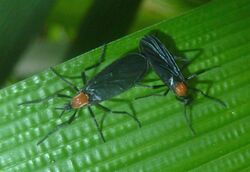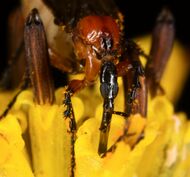Biology:Plecia
From HandWiki
Short description: Genus of March flies
| Plecia | |
|---|---|

| |
| P. ruficollis mating pair on underside of Setaria megaphylla leaf | |
| Scientific classification | |
| Kingdom: | Animalia |
| Phylum: | Arthropoda |
| Class: | Insecta |
| Order: | Diptera |
| Family: | Bibionidae |
| Genus: | Plecia Wiedemann, 1828 |
| Type species | |
| Hirtea fulvicollis (Fabricius, 1805) | |
| Species | |
|
See text
| |
| Synonyms | |
| |

Plecia is a genus of March flies (Bibionidae) comprising many species, both extant and fossilised.
Species
Extant species
- P. acutirostris Luo & Yang, 1988
- P. adiastola Hardy & Takahashi, 1960
- P. affinidecora Hardy, 1968[2]
- P. americana Hardy, 1940[3]
- P. amplipennis Skuse, 1888[4]
- P. aruensis Edwards, 1925[5]
- P. angularis Luo & Yang, 1988
- P. avicephaliforma Hardy, 1940[3]
- P. bicuspidata Luo & Yang, 1988
- P. bifida Hardy, 1968[2]
- P. bifoliolata Luo & Yang, 1988
- P. bisulca Hardy, 1968[2]
- P. boliviana Fitzgerald, 1998
- P. chinensis Hardy, 1949
- P. crenula Hardy, 1968[2]
- P. curtispina Hardy, 1968[2]
- P. cuspidata Hardy, 1968[2]
- P. digitiformis Luo & Yang, 1988
- P. dileracabilis Yang & Luo, 1989
- P. dimidiata Macquart, 1846
- P. duplicis Hardy, 1968[2]
- P. edwardsi Hardy, 1940[3]
- P. emeiensis Yang & Luo, 1989
- P. erebea Skuse, 1889
- P. erebeoidea Hardy, 1982
- P. forcipiformis Yang & Luo, 1989
- P. fulvicollis (Fabricius, 1805)
- P. hadrosoma Hardy & Takahashi, 1960
- P. hamata Hardy, 1968[2]
- P. impilosa Hardy, 1940[3]
- P. intricata Hardy, 1968[2]
- P. javensis Edwards, 1925[5]
- P. lateralis Hardy, 1940[3]
- P. lieftincki Hardy, 1968[2]
- P. longifolia Yang & Luo, 1989
- P. longiforceps Duda, 1933
- P. lopesi Hardy, 1940[3]
- P. mandibuliformis Yang & Luo
- P. membranifera Hardy & Takahashi, 1960
- P. multilobata Hardy, 1968[2]
- P. nagatomii Hardy & Takahashi, 1960
- P. nearctica Hardy, 1940[3] – Lovebug
- P. obtusicornis Hardy, 1968[2]
- P. obtusilobata Hardy, 1968[2]
- P. oculastra Hardy, 1968[2]
- P. okadai Hardy & Takahashi, 1960
- P. ornaticornis Skuse, 1889
- P. patula Hardy, 1968[2]
- P. pellucida Fitzgerald, 1998
- P. persimilis Hardy, 1940[3]
- P. plagiata Wiedemann, 1824
- P. propeforcipata Hardy, 1968[2]
- P. propria Hardy, 1968[2]
- P. protea Fitzgerald, 1998
- P. pruinosa Hardy, 1940[3]
- P. pudica Hardy, 1968[2]
- P. punctulata Hardy, 1940[3]
- P. ramosa Fitzgerald, 1998
- P. rhinigera Hardy, 1968[2]
- P. rostellata Loew, 1858
- P. rufangularis Luo & Yang, 1988
- P. ruficollis (Olivier, 1789) – Harlequin fly
- P. rufimarginata Hardy, 1940[3]
- P. rufiscutella Hardy, 1940[3]
- P. rugosa Hardy, 1940[3]
- P. serrifera Hardy, 1968[2]
- P. spilota Hardy, 1968[2]
- P. stricta Hardy, 1968[2]
- P. tephra Fitzgerald, 1998
- P. tetrascolata Hardy, 1968[2]
- P. thulinigra Hardy, 1961
- P. trifida Hardy, 1968[2]
- P. triquetra Fitzgerald, 1998
- P. trunca Fitzgerald, 1998
- P. xyele Fitzgerald, 1998
Fossil species
Many fossil species have been assigned to Plecia with ages dating from the Cretaceous (Campanian) through the early Pleistocene (Gelasian):[6]
Cretaceous
- †P. myersi Peterson, 1975 (Campanian, Canadian Amber, MB)
- †P. undans Zeuner, 1941 (Thanetian, ArdTun head, UK)
- Ypresian, Allenby Formation, Canada
- †P. angustipennis (Handlirsch, 1910)
- †P. canadensis (Handlirsch, 1910)
- †P. elatior (Handlirsch, 1910)
- †P. minutula Rice, 1959 (Allenby Formation)
- †P. nana (Handlirsch, 1910) (Allenby Formation)
- †P. pictipennis (Handlirsch, 1910) (Allenby Formation)
- †P. pulchra (Handlirsch, 1910) (Allenby Formation)
- †P. pulla (Handlirsch, 1910) (Allenby Formation)
- †P. similkameena Scudder, 1879 (Allenby Formation)
- †P. transitoria (Handlirsch, 1910) (Allenby Formation)
- †P. tulameenensis Rice, 1959 (Allenby Formation)
- Ypresian, Driftwood shales, Canada
- †P. cairnesi Rice, 1959
- Ypresian, Horsefly Shales, Canada
- †P. avus (Handlirsch, 1910)
- †P. curtula (Handlirsch, 1910)
- †P. dilatata (Handlirsch, 1910)
- †P. platyptera (Handlirsch, 1910) (Horsefly Shales)
- †P. reducta (Handlirsch, 1910) (Horsefly Shales)
- Ypresian, "Mission Creek site", Canada
- †P. kelownaensis Rice, 1959
- Ypresian, Oise amber, France
- †P. parisiensis Gee et al., 2001
- Ypresian, Green River Formation, USA
- †P. akerionana Fitzgerald, 1999
- †P. dejecta Scudder, 1890
- †P. pealei Scudder, 1890
- †P. rhodopterina Cockerell, 1925
- †P. winchesteri Cockerell, 1917
- †P. woodruffi Cockerell, 1916
- Priabonian, Baltic Amber
- †P. borussica Meunier, 1904
- †P. brunniptera Skartveit, 2009
- †P. clavifemur Skartveit, 2009
- †P. hoffeinsorum Skartveit, 2009
- †P. prisca Meunier, 1899
- †P. tenuicornis Skartveit, 2009
- Priabonian, France
- †P. angustiventris Theobald, 1937 ( Célas site, France)
- †P. chapuisii Oustalet, 1872
- †P. dumasi Theobald, 1937
- †P. foersteri Theobald, 1937
- Pribonian, United Kingdom
- †P. acourti Cockerell, 1921 (Bembridge Marls, UK)
- Priabonian, Florissant Formation, USA
- †P. axeliana Cockerell, 1915
- †P. decapitata Cockerell, 1917
- †P. explanata Cockerell, 1917
- †P. gradata Melander, 1949
- †P. melanderi Cockerell, 1911
- †P. orycta Melander, 1949
- †P. tessella Melander, 1949
- Rupelian, Brunstatt, France
- †P. gracillima Förster, 1891
- Rupelian, Corent, France
- †P. joannis Oustalet, 1870
- †P. larteti Oustalet, 1870
- †P. longipennis Oustalet, 1870
- †P. pallida Oustalet, 1870
- †P. rubescens Oustalet, 1870
- †P. sauvagei Oustalet, 1870
- Rupelian, Calcaires de Vacheres Formation, France
- †P. assonensis Gentilini, 1993
- †P. larguensis Gentilini, 1993
- †P. maimensis Gentilini, 1993
- Rupelian, Chadrat, France
- †P. oustaleti Brongniart, 1876
- Chattian, Niveau du gypse d'Aix, France
- †P. livida Heer, 1849
- †P. painvini Meunier, 1915
- †P. retracta Theobald, 1937
- †P. rhenana Heyden & Heyden, 1865
- Chattian, Camoins-les-Bains, France
- †P. theobaldi Skartveit & Nel, 2017
- Chattian, Rott Formation, Germany
- †P. collossea (Heyden & Heyden, 1865)
- †P. conica Theobald, 1937
- †P. dubia (Germar, 1837)
- †P. exigua Statz, 1943
- †P. gracilenta (Heyden & Heyden, 1865)
- †P. grossa Heyden & Heyden, 1865
- †P. hypogaea (Heyden & Heyden, 1865)
- †P. inflata Oustalet, 1870
- †P. luctuosa Heyden & Heyden, 1865
- †P. luteola Heyden & Heyden, 1865
- †P. lygaeoides Heer, 1849
- †P. macrocephala (Heyden & Heyden, 1865)
- †P. morio Heer, 1849
- †P. pennata Statz, 1943
- †P. pinguis (Heyden & Heyden, 1865)
- †P. proserpina Heyden & Heyden, 1865
- †P. rhenana Heyden & Heyden, 1865
- †P. sturmi Statz, 1943
- †P. stygia (Heyden & Heyden, 1865)
- †P. winnertzi (Heyden & Heyden, 1865)
Miocene
- Aquitanian, Mexican amber, Mexico
- †P. pristina Hardy, 1971
- Burdigalian, Shanwang Formation. China
- †P. aculeolata Zhang, 1989
- †P. bivalvula Zhang, 1993
- †P. capitata Zhang et al., 1994
- †P. diatoma Zhang, 1989
- †P. fumosa Zhang et al., 1994
- †P. gracilentula Evenhuis, 1994
- †P. ludongensis Hong & Wang 1985
- †P. platoptera Zhang, 1993
- †P. rectivenia Zhang, 1989
- †P. solaris Zhang, 1989
- †P. spinula Zhang, 1989
- †P. villosa Zhang, 1989
- †P. vulcania Zhang, 1989
- Burdigalian, Kudia River site, Russia
- †P. amagua Cockerell, 1925
- †P. obsitula Cockerell, 1925
- †P. kuznetzovi Cockerell, 1925
- †P. kudiella Cockerell, 1925
- †P. redempta Cockerell, 1925
- †P. refracta Cockerell, 1925
- Burdigalian - Langhian, Cypris Formation, Czech Republic
- †P. quaesita Novák, 1878
- Langhian, Chojabaru Formation, Japan
- †P. kanetakii Fujiyama, 1970
- Serravallian, Radoboj Formation, Croatia
- †P. bucklandi Heer, 1849
- Serravallian, Oehningen beds Member (Upper Freshwater-Molasse), Germany
- †P. hilaris Heer, 1849
- †P. jucunda Heer, 1849
- †P. macilenta Skartveit & Pika, 2014
- Messinian, Monte Castellaro, Italy
- †P. baglii Gentilini, 1991
- †P. castellaroi Gentilini, 1991
- †P. pisaurensis Gentilini, 1991
Pliocene
- Piacenzian, Togo Formation, Japan
- †P. intima Fujiyama & Iwao, 1974
Pleistocene
- Gelasian, Lac Chambon, France
- †P. brunneipennis Piton, 1939
- †P. vergnei Piton, 1935
Revision of the Bibionidae fossil record from the Oligocene of Germany by Skartveit and Wedmann (2021) included the redescription of a number of Plecia species.[7]
- Hesperinus heeri (Heyden & Heyden, 1865) (formerly Plecia heeri and syn P. elegantula )
References
- ↑ Hardy, D. Elmo (1950). "Studies in Pacific Bibionidae (Diptera). Part I.". Proceedings of the Hawaiian Entomological Society 14: 75–85.
- ↑ 2.00 2.01 2.02 2.03 2.04 2.05 2.06 2.07 2.08 2.09 2.10 2.11 2.12 2.13 2.14 2.15 2.16 2.17 2.18 2.19 2.20 2.21 2.22 2.23 Hardy, D. Elmo (1968). "Bibionidae (Diptera) of New Guinea". Pacific Insects (Honolulu, Hawaii, U. S. A.: The Bishop Museum) 10 (3-4): 443–513. http://hbs.bishopmuseum.org/pi/pdf/10(3)-443.pdf. Retrieved 10 August 2017.
- ↑ 3.00 3.01 3.02 3.03 3.04 3.05 3.06 3.07 3.08 3.09 3.10 3.11 3.12 Hardy, D. Elmo (1940). "Studies in New World Plecia (Bibionidae: Diptera)". Journal of the Kansas Entomological Society (Kansas: Kansas (Central States) Entomological Society) 13 (1): 15–27.
- ↑ Skuse, F. A. A. (1888). "Diptera of Australia. Part I". Proceedings of the Linnean Society of New South Wales 3 (2): 17–145, pls. 2–3.. https://www.biodiversitylibrary.org/page/36009431#page/671/mode/1up. Retrieved 10 August 2017.
- ↑ 5.0 5.1 Edwards, F. W. (1925). "Diptera Nematocera from the Dutch East Indies. [II.]". Treubia 6: 154–172.
- ↑ Fossilworks Plecia 12 July 2021
- ↑ Skartveit, J.; Wedmann, S. (2021). "A revision of fossil Bibionidae (Insecta: Diptera) from the Oligocene of Germany". Zootaxa 4909 (1): 1–77. doi:10.11646/zootaxa.4909.1.1.
Wikidata ☰ Q11995850 entry
 |
